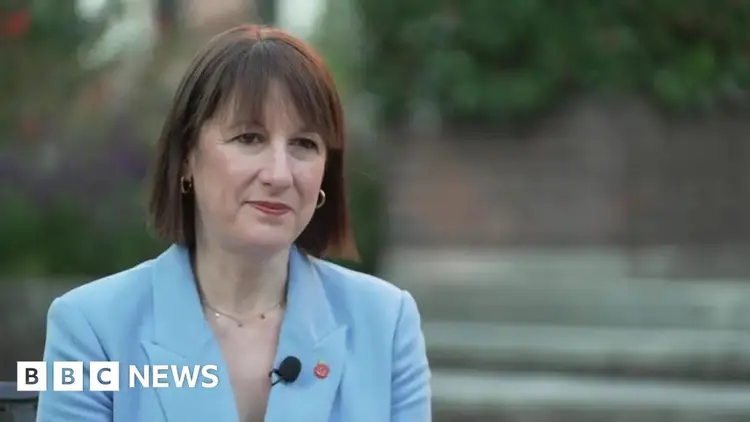Rachel Reeves: Chancellor changes debt rules to release billions

The chancellor informed the BBC that the government plans to revise its own debt regulations to unlock billions for infrastructure projects.
Rachel Reeves announced that she plans to modify the method used to calculate debt, enabling more funding for additional investments.
She mentioned that this was being done "to help boost our economy and create jobs and growth in Britain."
Nonetheless, Reeves' initial budget presentation next week is anticipated to result in reductions in public services and increases in taxes.
The government has pledged to reduce debt as a percentage of the economy during this parliamentary term, instead of over a continuous five-year timeframe.
However, the expanded debt measure is anticipated to permit an additional £50 billion in borrowing for major infrastructure investments, including roads, railways, and hospitals. It's worth noting that not all of this funding is likely to be designated during the Budget announcement.
"We are going to alter how we assess debt," Reeves informed the BBC, mentioning that she will provide more information about this on October 30th.
She mentioned that the Treasury plans to implement safeguards regarding investment expenditures. This will involve the National Audit Office and the Office for Budget Responsibility, which is the government's financial oversight body, overseeing and confirming the investments made to guarantee that they provide good value for money.
Reeves mentioned that having this kind of supervision would also "boost market confidence by ensuring that there are clear regulations governing the investments our country can pursue."
However, shadow chancellor Jeremy Hunt stated that the "steady guidance I received from Treasury officials was consistently that raising borrowing would lead to prolonged higher interest rates, ultimately hurting families with mortgages."
"The investors are keeping a close eye," he mentioned.
A representative from the Labour Party stated that they are not interested in hearing advice from the Conservatives about economic management, pointing to the chaos created by former Prime Minister Liz Truss's mini-budget.
It is clear that the additional flexibility in funding for investment initiatives cannot be utilized for increased daily expenses or to lower the scheduled tax increases in the Budget.
There’s increasing discussion about which taxes might go up next week. According to Labour's election manifesto, the party has pledged not to raise taxes on "working people," which includes National Insurance, income tax, and VAT.
The chancellor has indicated that companies should prepare for a rise in National Insurance. He emphasized that the commitment to "working people" pertains to the portion of the tax paid by employees, rather than the amount contributed by employers.
There has been some confusion about how the government defines "working individuals."
Later on Thursday, Prime Minister Sir Keir Starmer stated in an interview with Sky News that he does not view individuals who earn money from investments, like stocks or real estate, in addition to their regular jobs as true working individuals.
"They wouldn't fit my definition," he stated.
Previously, Reeves mentioned to the BBC that it is crucial for the government to manage its everyday expenses effectively. This involves ensuring that spending is covered by tax income and improving public services to enhance their efficiency.
The chancellor announced that she plans to establish stricter financial regulations regarding expenditures on welfare, government departments, and interest on debt.
She stated that this rule is the one that truly holds us back, and it’s challenging to comply with. It will necessitate tough choices regarding expenses, social services, and taxes.
The chancellor expressed her desire to undo what she refers to as "the downward trajectory" that she claims has been passed down from the former Conservative government.
She indicated that this could lead to a decrease in government investment from 2.6% of the economy last year to 1.7% by 2028-29, amounting to a reduction of £20 billion annually in actual spending.
"If we keep going down that road, we'll overlook other chances, and other nations will take advantage of them," she stated.
"We must put more resources into our economy to take advantage of the significant opportunities available in digital technology, life sciences, and clean energy. However, we can only achieve this if we rethink how we assess debt," she stated during a gathering at the International Monetary Fund (IMF) in Washington, D.C.
Sir Keir expressed to the BBC that the alteration in the debt regulations reflected the "attitude of the new administration."
"We're going to get everything sorted out," he stated. "When you're aware of the issue or challenge at hand—something every business and family understands—embrace it head-on and resolve it."
The Treasury had already indicated that a change in the rules was probably on the way before the Budget was announced.
The chancellor referenced prominent economists who support the decision, including former Bank of England governor and chief economist Mark Carney, along with Andrew Haldane, as well as ex-Conservative Treasury minister Jim O’Neill.
She also mentioned comments made by a senior official from the IMF recently.
The organization's deputy managing director, Gita Gopinath, expressed her support for increased investment in an interview with the BBC, saying, "I want to stress once more that the UK requires more public investment."
"When you look at the UK in relation to other G7 countries, you'll see that investment levels are lacking. This means that future spending will need to occur with regulations in place that help maintain debt stability over the next five years."
In a piece for The Times last week, Paul Johnson, the head of the Institute for Fiscal Studies think tank, pointed out that employing a wider debt metric known as public sector net financial liabilities might have negative effects. One concern he raised is that it could alarm financial markets, which are essential for supporting the government’s borrowing activities.









































